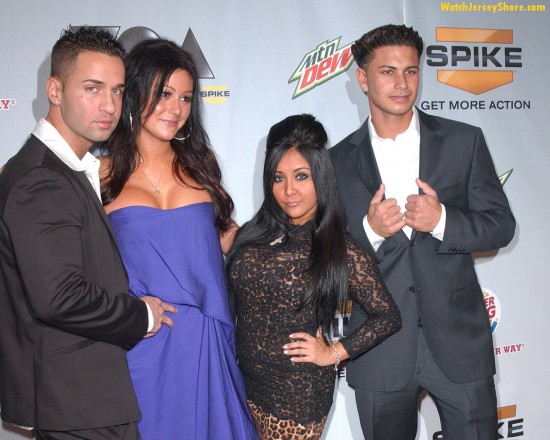
by Edward Kelly
First, I’m going to take you back—all the way back to the not-so-halcyon days of 2003. Reality TV was just starting to become a truly viable market. Its tropes and clichés were already well worn. Into this scene steps a little show with grand artistic ambitions: Spike TV’s “reality parody”, The Joe Schmo Show.
The Joe Schmo Show was entirely fake, save for one aspect. Each cast member (all of whom were up-and-coming improv comedians, including a pre-SNL Kristen Wiig) played a stereotypical reality TV contestant type (the catty gay man, the house slut, the grizzled former military guy). The “schmo” of the title was Matt Kennedy Gould, an average person who believed he was part of an actual reality show called Lap of Luxury. Gould didn’t find out the truth until the last episode. He was, understandably, shocked and pleaded with the rest of the cast, “What is going on?!?”
Reality TV is known to be mean-spirited and voyeuristic. While the creative forces behind The Joe Schmo Show may have been trying to reveal the artificiality of so-called “real” programming, they actually ended up revealing the producers, cast, and even audience to be a big bunch of jerks.
Joe Schmo is one of the few reality TV shows that I watched every episode as they aired. The more I became invested in the con, the more I felt like an ass for enjoying the elaborate trick played on Gould. I hoped he would figure it out. He didn’t and “What is going on?!?” became the symbol of everything wrong with reality TV—here was a nice dude who had been totally duped and (I think) hurt.
In other words, reality TV is no place for decent folks.
I stayed away from reality TV after that and decreed it was bad and exploitative and a detriment to the American people.
And then Jersey Shore aired.
It took one terribly campy 1960s television series, one arguably brilliant animated series, and five movies (three of which were good and the other two were directed by Joel Schumacher) until fans got the Batman movie they deserved: The Dark Knight. Likewise, it may have taken years of awful, disgusting, downright amoral reality TV series to bring us to Jersey Shore but, thankfully, we’re there now and we can enjoy it.
You see Joe Schmo had been trying to change the game, holding a mirror up to the genre and hoping that audiences would get how they were playing with the format. But the reason Joe Schmo wasn’t a huge hit (though it was successful enough to warrant a second season) was because reality TV is not a worthy satirical target and, despite its goals, Schmo ended up coming across as another cruel exercise in “look at this sucker.”
Jersey Shore, on the other hand, isn’t as ambitious with its meta-conceptuality as Schmo was. In fact, Shore is nothing if not a delightful embrace reality TV standards and a full-throated appreciation of all things trashy. And in that non-pretentiousness lies its genius.
The brilliance of Jersey Shore stems from the fact that everyone behind it knows exactly what kind of show they are making and are reveling in it. From the casting to the producing to the editing, everything is put in place for optimal immersion in this fantastical far-off land called “New Jersey”.
Now, rationally, I should feel bad about liking Jersey Shore. After all, I felt bad about being part of the swindle surrounding Matt Kennedy Gould. So, I should feel guilty about laughing my head off every time The Situation tells me the robbery is in progress or when Snooki strikes out time and time again with one of her “gorilla juiceheads.”
But I don’t. In fact, I delight in the schadenfreude provided by the shenanigans on Shore. And when I stop and think about it, I realize that the show is accomplishing everything The Joe Schmo Show tried and failed at.
If The Joe Schmo Show was trying its damnedest to hold up a mirror to the genre, Jersey Shore steps it up one level by holding up a mirror to the audience watching at home.
The show covers its cast in the same way that Jane Goodall covers apes: it offers up them up without much commentary and allows the audience to choose whether we will accept, reject, celebrate, or scorn. The response has been all of the above.
Simultaneously loved and derided, the kids (and The Situation, who, at 27, doesn’t count as a “kid” anymore) have become walking punch lines and symbols of the ADD generation. Are they really that way? Probably not, but who cares? They’re on TV, they say funny things, and embarrass themselves.
And therein lies the brilliance of the show. If The Sopranos can be seen as both a thrilling crime epic and a treatise on the dissolution of the American Dream, then Jersey Shore can be seen as both a ribald, never-ending party and an exploration of an American subculture that serves as a microcosm of a generation. The cast is identifiable, if only because everyone knows what is it like to be young, dumb and full of… well, you get the point. It’s snapshot of life that we don’t often get to see and, yeah, sometimes that snapshot is of an orange oompa-loompa downing Jägermeister and getting in catfights.
And if that ain’t art, then I don’t know what is.


